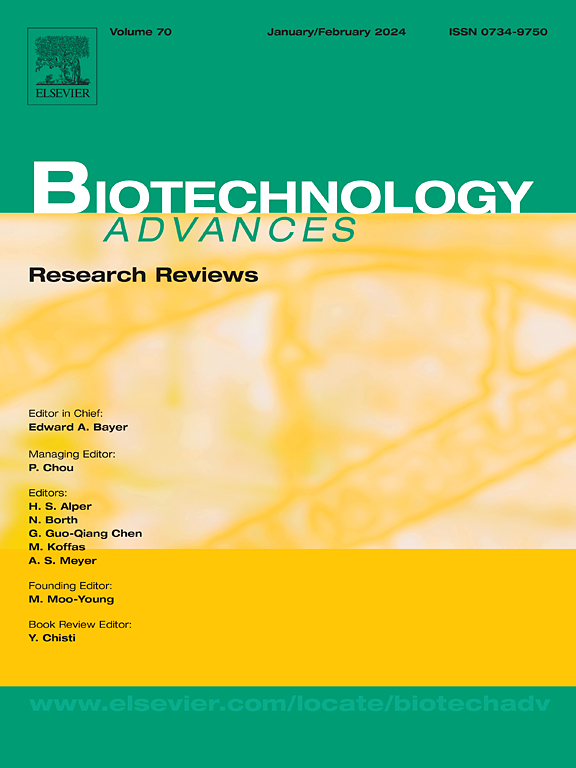聚酯衍生单体作为微生物原料:聚酯升级回收的景观导航
IF 12.1
1区 工程技术
Q1 BIOTECHNOLOGY & APPLIED MICROBIOLOGY
引用次数: 0
摘要
自20世纪初大规模使用以来,塑料已成为现代生活中不可或缺的一部分。然而,不适当的处理和回收方法导致了严重的环境后果。虽然传统的报废塑料管理主要依赖于填埋,但20世纪70年代出现了向回收和增值的范式转变,导致各种回收策略的发展,主要是机械化学,以及最近的生物解聚和升级回收方法。塑料升级回收是将塑料废物转化为高价值产品的一种可持续战略,它正在引起人们的关注,以减少对环境的影响和对原始材料的依赖。微生物塑料升级回收依赖于有效的解聚方法来产生单体底物,这些底物随后被天然或工程微生物系统代谢,产生有价值的生物产品。本文重点介绍了微生物聚酯升级循环的第二阶段,研究了使聚酯衍生单体同化和生物转化为工业相关化合物的细胞内代谢途径。考虑了具有商业意义的可生物降解和不可生物降解聚酯,重点是纯单体原料,以阐明细胞内碳同化途径。了解这些代谢过程为未来的代谢工程工作提供了基础,旨在优化微生物系统,将混合塑料水解物有效地转化为有价值的生物产品。本文章由计算机程序翻译,如有差异,请以英文原文为准。
Polyester-derived monomers as microbial feedstocks: Navigating the landscape of polyester upcycling
Since their large-scale adoption in the early 20th century, plastics have become indispensable to modern life. However, inadequate disposal and recycling methods have led to severe environmental consequences. While traditional end-of-life plastics management had predominantly relied on landfilling, a paradigm shift towards recycling and valorization emerged in the 1970s, leading to the development of various, mostly mechanochemical, recycling strategies, together with the more recent approach of biological depolymerization and upcycling. Plastic upcycling, which converts plastic waste into higher-value products, is gaining attention as a sustainable strategy to reduce environmental impact and reliance on virgin materials. Microbial plastic upcycling relies on efficient depolymerization methods to generate monomeric substrates, which are subsequently metabolized by native or engineered microbial systems yielding valuable bioproducts. This review focuses on the second phase of microbial polyester upcycling, examining the intracellular metabolic pathways that enable the assimilation and bioconversion of polyester-derived monomers into industrially relevant compounds. Both biodegradable and non-biodegradable polyesters with commercial significance are considered, with emphasis on pure monomeric feedstocks to elucidate intracellular carbon assimilation pathways. Understanding these metabolic processes provides a foundation for future metabolic engineering efforts, aiming to optimize microbial systems for efficient bioconversion of mixed plastic hydrolysates into valuable bioproducts.
求助全文
通过发布文献求助,成功后即可免费获取论文全文。
去求助
来源期刊

Biotechnology advances
工程技术-生物工程与应用微生物
CiteScore
25.50
自引率
2.50%
发文量
167
审稿时长
37 days
期刊介绍:
Biotechnology Advances is a comprehensive review journal that covers all aspects of the multidisciplinary field of biotechnology. The journal focuses on biotechnology principles and their applications in various industries, agriculture, medicine, environmental concerns, and regulatory issues. It publishes authoritative articles that highlight current developments and future trends in the field of biotechnology. The journal invites submissions of manuscripts that are relevant and appropriate. It targets a wide audience, including scientists, engineers, students, instructors, researchers, practitioners, managers, governments, and other stakeholders in the field. Additionally, special issues are published based on selected presentations from recent relevant conferences in collaboration with the organizations hosting those conferences.
 求助内容:
求助内容: 应助结果提醒方式:
应助结果提醒方式:


